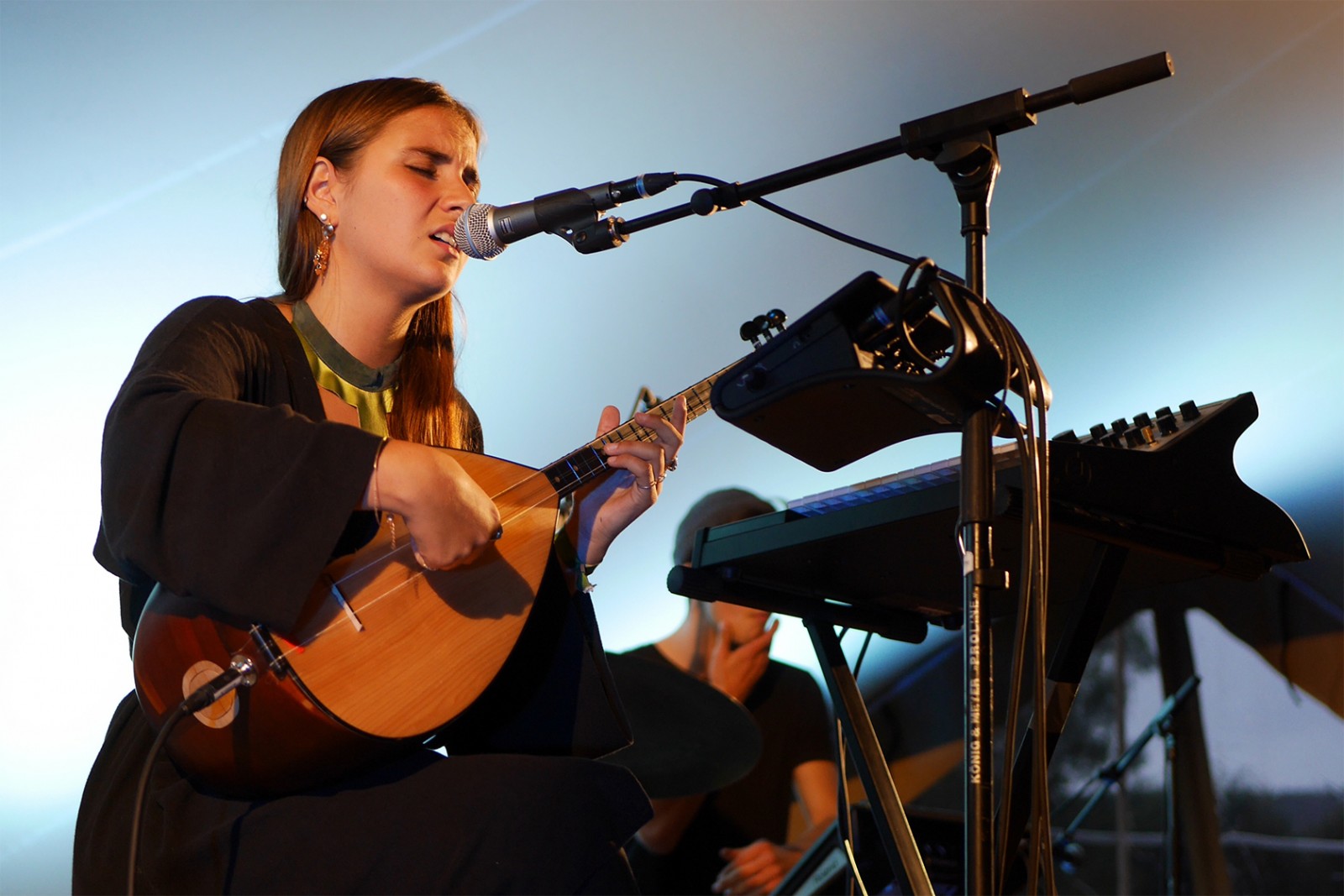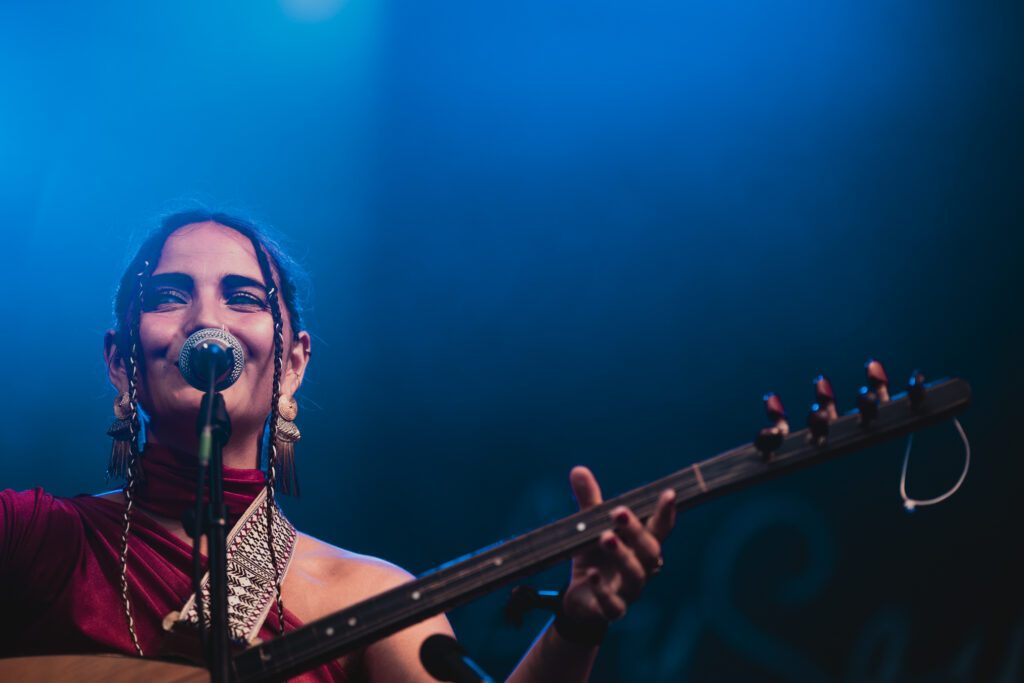Danish-born musical artists Tobias Rahim and Luna Erşahin, whose fathers are Kurdish, have been on tour in recent months. At concerts at the Royal Arena in Copenhagen on April 1 and in Roskilde on July 1, they sang Kurdish songs and danced the Kurdish halay in front of thousands, performances widely covered on social media as well as in print and visual media. Kurdistan Chronicle was able to interview Luna, but unfortunately Tobias declined our request for an interview.
Expressing that her roots have always been important to her, Luna states that she started learning Kurdish and singing in the language to connect with her family background.
When asked about bans on concerts, Luna said: “No activity based on ethnicity, religion, sexuality, or gender should ever be banned.”

Kurdistan Chronicle (KC): As far as I know, both you and Tobias have Kurdish fathers and Danish mothers. Can you tell us a bit more about Tobias and yourself?
Luna Erşahin (LE): Tobias and I share the same ancestry. Our mothers are Danish, and our fathers are Kurdish. Tobias’ father comes from Kelhasan, and my father comes from Çorum. We were both born in Denmark.
My roots have always been very important to me.
Growing up around different languages, I was always very confused about who I was. Was I Danish? Turkish? Kurdish? I discovered that I could dive into my roots through music and started playing bağlama, a kind of long-necked lute played in and around Turkey. I started to learn folk music and to sing in Turkish, Kurdish, Greek, Spanish, Swedish, and many other languages. This brought me closer to the world and the richness of languages. My Kurdish heritage became very important for me, but unfortunately I never learned Kurdish. I have been very happy to have my friend and journalist Mevlüt Oğuz translate lyrics that I wrote in Turkish into Kurdish, which he has done for all my Kurdish songs. I have started to learn Kurmanji and hope to be able to speak fluently in the future!
I am trying to better understand my cultural background and show the whole world that I am proud of my heritage. Because of all of this, the song “Kurder I København” means a lot to me, and to Tobias too!

KC: Thousands at the Royal Arena sang along to the Kurdish song performed by you and Tobias and danced the Kurdish halay under the shade of the flag of Kurdistan. How did the idea to sing a Kurdish song and dance halay come about?
LE: I wrote to Tobias a few years back, asking him how he approaches his heritage in his art, since I’m very interested in this topic. After some time, he invited me to come to the studio to sing a Kurdish song for his album. The song, “Kurder I København,” started in his mind, and then he reached out to other Kurdish artists like me, including Zaman Kılıç and the bağlama player Alper Şahin, to co-create the rest. Kılıç sings the chorus and is a relative of Tobias. Şahin is an amazing wedding musician and plays the bağlama solo in “Kurder I København.”
We wanted to create a feeling of community and show the beauty of Kurdish culture and music.
Tobias and his team decided to do the Kurdish halay and to bring the flag onstage and so on! At the concert on the Orange Stage in Roskilde, Tobias said that he dedicated the song to his grandfather and all the other immigrants who have made Denmark their new home. It was a humbling, meaningful, and beautiful experience.
KC: Your performance at Royal Arena was widely covered on social media, as well as in print and visual media. What were your feelings about this response?
LE: I’m overwhelmed and see the power of the Kurdish community in these kinds of situations. In 2019, a video in which I sang “Ez Kevok Im” in Chile also went viral, and it’s simply amazing how so many people reach out to tell you that they are proud of you. It can also be hard because many people have different opinions on what you should do and how you should do it. I try to connect with myself and stay centered.

KC: While thousands who do not even speak Kurdish sing along to your songs, concerts of Kurdish artists are sometimes avoided or outright banned in Kurdish provinces in Turkey. What do you think about these bans?
LE: No activity based on ethnicity, religion, sexuality, or gender should ever be banned.
KC: Who are the Kurdish and foreign artists who have influenced you and shaped your art?
LE: I absolutely love Aynur Doğan and Kardeş Türküler; they have been huge inspirations for me.
KC: Do you think you might plan a tour in Kurdistan with Tobias?
LE: I don’t know about Tobias, but I will definitely come one day!

KC: Are there any artists with whom you would like to collaborate?
LE: Aynur Doğan and Kardeş Türküler!
KC: What have you been doing lately and what are your plans in terms of Kurdish music?
On August 25 of this year, my band AySay will release a version of “Ez Kevok Im,” for which I have written new lyrics in Danish mixed with Kurdish. It will be a first, and I’m very excited about it. I’m nervous about how Kurdish people will take it, and I hope they will like it. In October we will also release our second album KÖY, which has songs in Danish, Kurdish, and Turkish. For now, my plan is to play many concerts in the coming few years.
Biography
Born in 1995, Luna Erşahin is both Kurdish and Danish. Erşahin recently finished her bachelor’s degree at the Rhythmic Music Conservatory in Copenhagen. She plays with her band AySay and has a duo with Kurdish musician Rezwan Taha. She won three Danish music awards for Album of the Year 2022 (Su Akar).
Mevlüt Oğuz was born in 1987 in Batman’s Hasankeyf, Mevlüt Oğuz is a journalist, poet, and activist working in the fields of civil society, culture, and the arts, who resides in Istanbul. He is a member of the International Federation of Journalists (IFJ), the Kurdish PEN affiliated to International PEN, and the Istanbul branch of the Human Rights Association (İHD).

